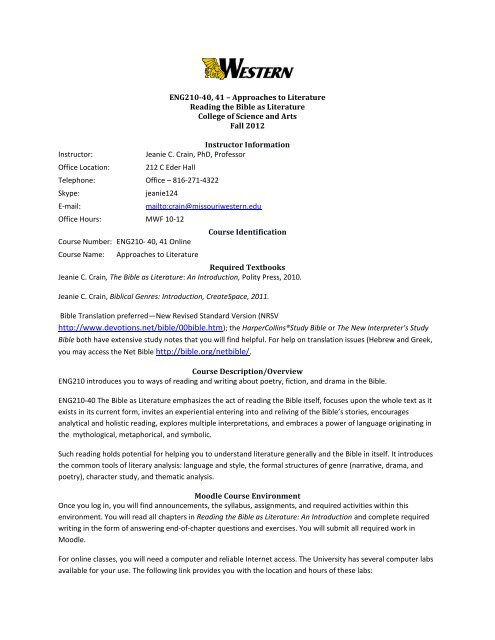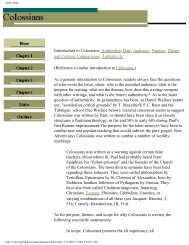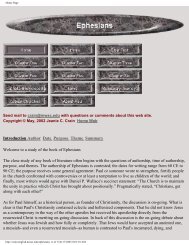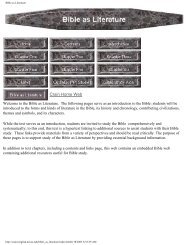ENG210-41 - Crain Home
ENG210-41 - Crain Home
ENG210-41 - Crain Home
Create successful ePaper yourself
Turn your PDF publications into a flip-book with our unique Google optimized e-Paper software.
<strong>ENG210</strong>-40, <strong>41</strong> – Approaches to Literature<br />
Reading the Bible as Literature<br />
College of Science and Arts<br />
Fall 2012<br />
Instructor Information<br />
Instructor: Jeanie C. <strong>Crain</strong>, PhD, Professor<br />
Office Location: 212 C Eder Hall<br />
Telephone: Office – 816-271-4322<br />
Skype: jeanie124<br />
E-mail: mailto:crain@missouriwestern.edu<br />
Office Hours: MWF 10-12<br />
Course Number: <strong>ENG210</strong>- 40, <strong>41</strong> Online<br />
Course Name: Approaches to Literature<br />
Course Identification<br />
Required Textbooks<br />
Jeanie C. <strong>Crain</strong>, The Bible as Literature: An Introduction, Polity Press, 2010.<br />
Jeanie C. <strong>Crain</strong>, Biblical Genres: Introduction, CreateSpace, 2011.<br />
Bible Translation preferred—New Revised Standard Version (NRSV<br />
http://www.devotions.net/bible/00bible.htm); the HarperCollins®Study Bible or The New Interpreter’s Study<br />
Bible both have extensive study notes that you will find helpful. For help on translation issues (Hebrew and Greek,<br />
you may access the Net Bible http://bible.org/netbible/.<br />
Course Description/Overview<br />
<strong>ENG210</strong> introduces you to ways of reading and writing about poetry, fiction, and drama in the Bible.<br />
<strong>ENG210</strong>-40 The Bible as Literature emphasizes the act of reading the Bible itself, focuses upon the whole text as it<br />
exists in its current form, invites an experiential entering into and reliving of the Bible’s stories, encourages<br />
analytical and holistic reading, explores multiple interpretations, and embraces a power of language originating in<br />
the mythological, metaphorical, and symbolic.<br />
Such reading holds potential for helping you to understand literature generally and the Bible in itself. It introduces<br />
the common tools of literary analysis: language and style, the formal structures of genre (narrative, drama, and<br />
poetry), character study, and thematic analysis.<br />
Moodle Course Environment<br />
Once you log in, you will find announcements, the syllabus, assignments, and required activities within this<br />
environment. You will read all chapters in Reading the Bible as Literature: An Introduction and complete required<br />
writing in the form of answering end-of-chapter questions and exercises. You will submit all required work in<br />
Moodle.<br />
For online classes, you will need a computer and reliable Internet access. The University has several computer labs<br />
available for your use. The following link provides you with the location and hours of these labs:
http://www.missouriwestern.edu/imc/acs/labsmap.asp<br />
Course Policies<br />
Disability: If you have been diagnosed with a disability or if you suspect that you may have a disability that has<br />
never been diagnosed and would like to find out what services may be available, please visit the Office of Disability<br />
Services (ODS) in Eder Hall, room 203N or visit the ODS website at http://www.missouriwestern.edu/ds/ as soon as<br />
possible. This syllabus, as well as all other printed or electronic materials, can be made available in<br />
alternative/accessible formats if requested with sufficient prior notice. Missouri Western is an equal<br />
opportunity/affirmative action institution.<br />
Academic Honesty: Violations of academic honesty include any instance of plagiarism, cheating, seeking credit for<br />
another's work, falsifying documents, or academic records, or any other fraudulent classroom activity. Plagiarism is<br />
the unaccredited use (both intentional and unintentional) of somebody else's words or ideas. Violations of<br />
academic honesty will result in a failing grade on the assignment, failure in the course, or expulsion from school.<br />
Please consult your Student Handbook. See full policy<br />
http://www.missouriwestern.edu/acadaff/documents/AcademicHonestyPolicy.pdf.<br />
Attendance Policy: While you experience more freedom in online classes, you still must meet the same standards<br />
required of a traditional class. This means scheduling sufficient time for reading all assigned materials and<br />
completing all required writing for the course. Assigned materials should be read prior to the first day of the<br />
week’s assignments. You must meet all deadlines for submitting required material.<br />
Late Work: You are expected to meet all submission deadlines with no extension on due dates.<br />
Course Learning Objectives<br />
1. Acquire familiarity with several of the tools used for reading and understanding literature generally:<br />
language and style, the formal structures of genre (narrative, drama, and poetry), character study, and<br />
thematic analysis.<br />
2. Learn that the Bible shares the mythological, metaphorical, and symbolic language that belongs to<br />
literature across the centuries.<br />
3. Read and study significant passages in the Bible and learn something about the Bible as a whole, which<br />
includes the Jewish and Christian biblical canons.<br />
4. Learn to read the Bible more closely and to appreciate its nuanced and layered levels of meaning and<br />
its broad appeal to the interpretive imagination.<br />
5. Discover a library that invites you to engage at deeper levels of study and to greater depths of insight;<br />
you have discovered why the Bible continues to appeal to and attract more scholarship than any other<br />
collection of literature.<br />
Course Website(s)<br />
Bible as Literature Web<br />
Course Resources<br />
Professor’s <strong>Home</strong> Page (includes electronic, older Bible as Literature and other Bible Analyses)
Course Requirements<br />
Approximately every two weeks, you will read and complete writing assignments for one chapter in Reading the<br />
Bible as Literature: An Introduction. This requires reading carefully, taking comprehensive notes, answering five<br />
assigned end-of-chapter reflective questions (in paragraph form, contain a minimum 7-10 sentences) and<br />
completing one exercise (4 to 7 well developed paragraphs) submitted as one attachment under Assignments.<br />
Assigned at the beginning of the reading period, questions and exercises must be posted in Moodle on the due<br />
date at the end of the second week. Additionally, you are required to post one forum entry by Friday of the first<br />
cycle of reading each chapter that discusses some aspect of the assigned reading material, this including your<br />
textbook and articles and links (1 single-spaced document using Times 10-point font). You should work in Microsoft<br />
Word then copy and paste your forum entry into Moodle. Please edit your work carefully. You are also expected to<br />
read and reply to the posted work of at least two group members. You will receive a MT and Finals grade on these<br />
forums. You will have a one-time opportunity to gain up to 10 make-up points by writing a 4-page, single-spaced<br />
10 point font) paper that uses the two chapters on genres in the Reading the Bible and the supplemental text<br />
Biblical Genres. You should compare literary genres (Reading the Bible) to biblical genres (Biblical Genres). This<br />
work must be posted by week thirteen (Nov. 26-30).<br />
Evaluation Guide<br />
The following guide should enable you to understand how your work for each chapter will be evaluated (seven<br />
chapters, seven letter grades):<br />
Completing assigned work (5 end-of-chapter questions and 1 end-of-chapter exercise)<br />
Thoughtful, original, and well-developed content (reflecting chapter understanding, application and use of<br />
literary tools, and illustration/explication of biblical passages)<br />
Organization (5-7 sentences for questions and 4-7 paragraphs for exercise)<br />
Grammar and mechanics<br />
You will receive one letter grade (based on a 10-point scale explained under grading scheme) for each of the seven<br />
chapters. In addition, you will receive two letter grades for Course Forums (one at Midterm and another at Finals).<br />
Your final grade will be an average of these nine grades.<br />
Reading and Writing Assignments Points per<br />
chapter<br />
Completed Assignment (for each chapter): Answer assigned<br />
five end-of-chapter questions and complete two assigned<br />
exercises; submit by required due date (using Discussions link in<br />
WebCT); please identify your work to correspond with chapter<br />
questions and exercise prompts.<br />
Requirements<br />
10 Written work completed<br />
and posted
Content: Read and reflect on assigned chapters, completing<br />
questions and exercises with thoughtful, original, and welldeveloped<br />
responses.<br />
Understanding of chapter (10 points)<br />
Application to reading the Bible (from understanding as<br />
sacred text and theology to understanding as literature<br />
using the common tools of literary analysis)-(25 points)<br />
Illustrations/explication (references to biblical texts)-<br />
(15 points)<br />
Organization:<br />
Questions: (15 points)<br />
Exercises: (15 points)<br />
Grammar and Mechanics<br />
Course Forums 2 letter grades<br />
at Midterm<br />
and Finals<br />
50 Original, thoughtful, welldeveloped<br />
responses<br />
30<br />
Answer 5 questions in<br />
short paragraphs (7-10<br />
sentences minimum).<br />
Short essays (4 to 7 well<br />
developed paragraphs):<br />
includes introduction<br />
(thesis), body, and<br />
conclusion.<br />
10 Written work has been<br />
carefully edited with<br />
attention to grammatical<br />
and effective sentences,<br />
punctuation, and<br />
mechanics. You are<br />
advised to consult a<br />
Handbook such as the one<br />
found in the The St.<br />
Martin’s Guide to Writing.<br />
Forums provide an<br />
opportunity to reflect on<br />
what you are reading and<br />
learning in each chapter in<br />
an environment where you<br />
are expected to contribute<br />
to and to read others’<br />
forum entries.
Make-up Opportunity Up to 10 points You will have a one-time<br />
opportunity to make-up<br />
one missed assignment by<br />
writing a 4-page, singlespaced<br />
10 point font)<br />
paper that uses the two<br />
chapters on genres in the<br />
Reading the Bible and the<br />
supplemental text Biblical<br />
Genres. You should<br />
compare literary genres<br />
(Reading the Bible) to<br />
biblical genres (Biblical<br />
Genres). This work must be<br />
posted by week thirteen<br />
(Nov. 26-30).<br />
Letter<br />
Grade Percentage<br />
Grading Scheme<br />
Grade<br />
points/credit Rating<br />
A 90% & above 4.00 Excellent<br />
B 80% – 89% 3.00 Good<br />
C 70% –79% 2.00 Average<br />
D 60% – 69 1.00 Below Average<br />
F 59% and below 0.00 Failure<br />
I An incomplete grade may be given when accident, illness, death in the<br />
immediate family, or other documented circumstances beyond your<br />
control prevent you from completing some course requirements. An<br />
incomplete grade will be considered only when you have satisfied the<br />
majority of course requirements. An incomplete grade must be removed<br />
within six weeks after the first day of the next term (fall, spring, summer)<br />
of the semester in which it was received; otherwise, the grade will be<br />
recorded as "F."<br />
University Fall Schedule
Week One Aug. 27-31<br />
Assignment: Read Preface and Chapter 1<br />
Week Two Sept. 4-7<br />
Course Schedule<br />
Complete Assignment posting for Preface and Chapter 1 by 12:00 midnight Sept. 7.<br />
Week Three 10-14<br />
Assignment: Read Chapter 2.<br />
Week Four 17-21<br />
Complete Assignment posting for Chapter 2 by 12:00 midnight Sept. 22<br />
Week Five 24-28,<br />
Assignment: Read Chapter 3.
Week Six Oct. 1-5<br />
Complete Assignment posting for Chapter 3 by 12:00 midnight Oct. 5.<br />
Week Seven 8-12<br />
Assignment: Read Chapter 4.<br />
Week Eight 15-19<br />
Complete Assignment posting for Chapter 4 by 12:00 midnight Oct. 19.<br />
Week Nine 22-26 MT Grades due Oct. 24<br />
Assignment: Read Chapter 5.<br />
Week Ten Oct 29- Nov. 2 Last Day to withdraw Nov. 2<br />
Complete Assignment posting for Chapter 5 by 12:00 midnight Nov. 2.<br />
Week Eleven 5-9<br />
Assignment: Read Chapter 6.<br />
Fall Break 18-25<br />
Week Twelve 12-16<br />
Complete Assignment posting for Chapter 6 by 12:00 midnight Nov. 16.<br />
Week Thirteen 26-30<br />
Post 4-page make-up work by the end of this week. The make-up work will be used in lieu of one missed<br />
assignment and must be assessed in the same way as chapter assignments.<br />
Assignment: Read Chapter 7.<br />
Week Fourteen Dec. 3-7<br />
Complete Assignment posting for Chapter 7 by 12:00 midnight Dec. 7.<br />
Last Day Class Dec. 7<br />
Week Fifteen Final Examination Dec. 8-14<br />
Final grades will be posted Dec. 14. Your final grade for the course will be an average of the seven grades<br />
received for chapter work and the two grades received for forum postings at mid-term and Finals. You have a onetime<br />
opportunity to post make-up work by the end of week thirteen. The make-up work will be used in lieu of one<br />
missed assignment and must be assessed in the same way as chapter assignments.






![[38cb1273][0][sourcelist][1][0] - Crain Home](https://img.yumpu.com/2168350/1/190x245/38cb12730sourcelist10-crain-home.jpg?quality=85)